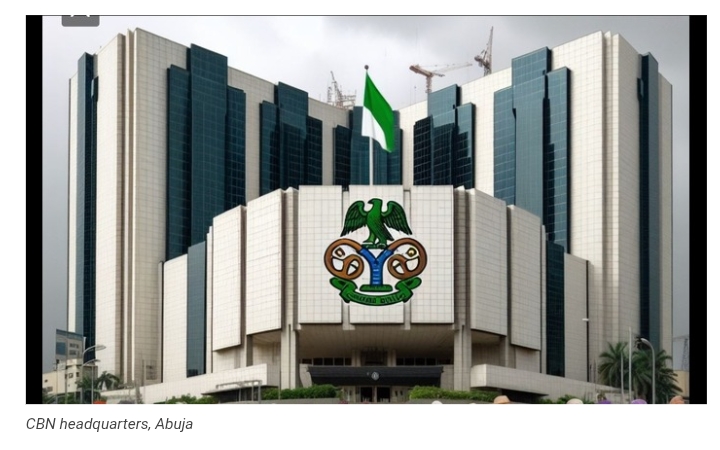E-Financial
FG Directs FIRS to Remit NASENI Statutory Cash to Boost Technology

The Presidency has directed the Federal Inland Revenue Service (FIRS), to remit the statutory deductions accruable to the National Agency for Science and Engineering Infrastructure (NASENI).

This is part part of steps to boost Science and Technology development in the country.
The agency may soon get one to two per cent of the Federation Account as contained in its establishment law.
The directive followed the upholding of the decision of the Governing Board of NASENI, which is headed by President Muhammadu Buhari as the chairman.
The directive has also been communicated to the Minister of Finance, Budget and National Planning, Mrs.
In the NASENI Establishment Act 2004, FIRS is statutorily expected to deduct and remit to it a quarter per cent of the levy on turnover of firms earning over N100million and above.
Although NASENI was established in 1992, the law guiding its funding has not been complied with by successive governments.
But in January, President Muhammadu Buhari decided to ensure total compliance with NASENI Act. Buhari has also approved the placement of NASENI directly under the supervision of the Presidency instead of the Ministry of Science and Technology.
According to a letter from the Presidency, signed by Prof. Ibrahim Gambari, chief of Staff, the FIRS has been directed to remit the deducted levy on turnover as approved by Buhari.
The letter said: “I write to inform you that on 24th January 2021, Mr. President approved the prayers of the Executive Vice Chairman (EVC) of the National Agency for Science and Engineering Infrastructure (NASENI) on the funding of NASENI activities.
“In accordance with the NASENI Establishment Act, one of the prayers of the EVC relates to the funding of the agency via a levy on income or turnover of commercial companies and firms with turnover of N4million (later increased to N100million) by the NASENI Governing Board) at the rate of a quarter per cent( 1/4 %) of turnover.
“Accordingly, you are kindly requested to act on the implementation of this provision of the NASENI Act as soon as possible.”
It was learnt that the presidential directive was informed by seven key projects (inventions) being under-taking by NASENI with funding as a major hindrance.
One of the key projects is a Made-In-Nigeria helicopter which Buhari has mandated NASENI to produce.
Others are as follows establishment of First Made-In- Nigeria Transformer Plant and High Voltage Testing Laboratory to be located in Okene, Kogi State; first Made-In-Nigeria Plant for the manufacturing of Silica which is the major materials needed for local manufacturing of solar panels to resolve alternative/Renewable Energy supply for the nation; and funding of the plant for First Made-In-Nigeria Smart Prepaid Energy Meter (SPEM), which is already patented, before transferring them to private sector entrepreneurs as stipulated by its mandate.
Also included are establishment of Zonal (Six geo-political Zones) Agricultural Machinery & Equipment Development Institutes which had already been approved by President Muhammadu Buhari; completion of work on First Made-in-Nigeria E-Voting solutions designed and produced by Nigerian Engineers in NASENI; and completion of work on Reverse Engineering process of 5 Kilowatt small Hydro Kinetic Turbine.
A document, which explained how the decision to implement NASENI Act was taken by the President, read: “The President is the chairman of the Governing Board of NASENI. But the Executive Vice Chairman/CEO of NASENI, Prof. Mohammed Sani Haruna, in his memo to the Governing Board on December 30, 2020, requested the implementations of the Statutory funding of the agency as provided for in NASENI Act to finance its projects and activities.
“While reflecting on the state of Nigeria’s response so far on the COVID-19 pandemic during a virtual meeting at the Presidential Villa on January 26th, 2021, the President observed that Nigeria’s continued reliance on solutions from other countries was a revelation of the research and development gap in the nation.
“He, in addition, therefore directed NASENI to scale up its responses to the pandemic in order to find appropriate solutions to prevent the further spread and treatment of the virus.
“Sitting as the Chair of the Board, the President stressed that for NASENI to succeed, it must be empowered through adequate provision of financial, human and material resources and allowed to exercise independence to forge partnerships.
E-Financial
NDIC Declares Second Liquidation Dividend for Heritage Bank Depositors

Nigeria Deposit Insurance Corporation (NDIC) has declared a second liquidation dividend of ₦24.3 billion for depositors of Heritage Bank Limited (in liquidation) whose account balances exceeded the statutory insured limit of ₦5 million at the time of the bank’s closure.

Heritage Bank’s operating licence was revoked by the Central Bank of Nigeria (CBN) on June 3, 2024, after which the NDIC was appointed liquidator in line with the Banks and Other Financial Institutions Act (BOFIA) 2020 and the NDIC Act 2023.
In a statement signed by Hawwau Gambo, head of the Communication and Public Affairs Department, the Corporation said “the second liquidation dividend would be paid at a rate of 5.2 kobo per ₦1.00 on outstanding uninsured balances. This brings the total liquidation dividend paid so far to 14.4 kobo per ₦1.00.
“The NDIC has now declared a second liquidation dividend of ₦24.3 billion. This amount, derived from debt recovery, sale of physical assets, and realisation of investments, will be applied to the payment of uninsured balances for depositors with funds exceeding the ₦5 million insured limit. The second liquidation dividend is payable at a rate of 5.2 kobo per ₦1.00 on outstanding balances, in accordance with Section 72 of the NDIC Act 2023. This brings the cumulative liquidation dividend declared to date to 14.4 kobo per ₦1.00”.
The NDIC recalled that it had earlier paid a first liquidation dividend of ₦46.6 billion in April 2025, representing 9.2 kobo per ₦1.00, following the reimbursement of insured deposits of up to ₦5 million per depositor from its Deposit Insurance Fund.
According to the Corporation, the second tranche was made possible through sustained recovery of debts and continued asset disposal.
“This payment is in furtherance of our statutory responsibility to ensure that depositors of closed banks are reimbursed promptly as assets are realised,” the NDIC said.
The Corporation explained that payments would be made automatically to eligible depositors using existing records. Depositors who have already received their insured deposits and the first liquidation dividend will have their alternative bank accounts credited automatically through their Bank Verification Numbers (BVN).
However, depositors without alternative bank accounts or BVNs, as well as those who have not claimed their insured deposits or the first liquidation dividend, were advised to visit the nearest NDIC office nationwide or complete the e-claim form on the Corporation’s website for verification and processing.
The NDIC noted that liquidation dividends are paid only to depositors with balances above the insured limit and are sourced from asset sales and recoveries. Other creditors and shareholders will be considered only after all depositors have been fully reimbursed and subject to the availability of funds.
The Corporation assured the public that the ₦24.3 billion payment represents only the second liquidation dividend, adding that further payments would be made as additional assets are realised and outstanding debts recovered.
Depositors were advised to contact the NDIC Claims Resolution Department at any of its offices nationwide or through the Corporation’s official email addresses and helplines for further enquiries.
E-Financial
KPMG Identifies ‘Flaws, Inconsistencies, and Omission’ in New Tax Law

KPMG Nigeria has identified what’s described as “errors, inconsistencies, gaps and omissions” in Nigeria’s tax laws that came into force at the beginning of this year.

The professional services company warns that these issues could undermine the attainment of the tax reforms’ stated objectives if left unaddressed.
The reforms, anchored on the Nigeria Tax Act (NTA) and the Nigeria Tax Administration Act (NTAA), alongside the Nigeria Revenue Service (NRS) Establishment Act and the Joint Revenue Board (JRB) Establishment Act, are aimed at improving revenue generation, simplifying tax administration, and enhancing competitiveness.
Authorities have repeatedly described the overhaul as critical to strengthening Nigeria’s weak tax-to-GDP ratio and adapting the tax system to changing economic realities.
Capital gains, inflation, and market behaviour
One of the most far-reaching concerns relates to the computation of chargeable gains under Sections 39 and 40 of the Nigeria Tax Act, which require capital gains to be calculated as the difference between sale proceeds and the tax-written-down value of assets, without any adjustment for inflation, analysis by KPMG revealed.
This approach has attracted attention largely because of Nigeria’s inflation environment. Headline inflation has remained in double digits for eight consecutive years, averaging above 18 percent between 2022 and 2025, according to data from the National Bureau of Statistics. Over the same period, asset price movements have been heavily influenced by currency depreciation and general price increases.
Actual market behaviour shows a mixed reaction to tax policy expectations, despite a strong full‑year rally, with the NGX All‑Share Index up more than 50 percent and market capitalisation near N99.4 trillion, the equities market saw significant sell‑offs in late 2025, including a N6.5 trillion drop in market value in November amid uncertainty over the new capital gains tax rules, underscoring investor sensitivity to tax policy shifts.
In its review of the law, KPMG Nigeria noted that taxing nominal gains in a high-inflation environment could result in taxpayers being assessed on inflationary gains rather than real economic value. The firm recommended the introduction of a cost indexation allowance to adjust asset values for inflation when computing chargeable gains.
According to the analysis, such an adjustment would reduce distortions in effective tax rates while still allowing the government to generate additional revenue from genuine capital appreciation.
Indirect transfer rules and foreign investment risks
Another provision drawing scrutiny is Section 47 of the Nigeria Tax Act, which subjects gains from indirect transfers of shares or assets by non-residents to Nigerian tax where such transfers result in changes in ownership of Nigerian companies or assets located in Nigeria.
The provision is being introduced amid weak foreign investment inflows. Data from the United Nations Conference on Trade and Development shows that foreign direct investment into Nigeria remains below pre-2019 levels, reflecting broader investor caution.
While similar indirect transfer rules exist in other jurisdictions, analysts note that such regimes are typically supported by detailed guidance and clear thresholds to reduce uncertainty.
KPMG’s analysis recommended that Nigerian tax authorities issue clear administrative guidance defining the scope, thresholds, and reporting obligations associated with indirect transfers. The firm noted that clarity would reduce the risk of disputes, improve compliance, and mitigate potential negative effects on foreign investment flows.
FX deductions clash with economic realities
Section 24 of the Nigeria Tax Act limits businesses from deducting foreign-currency expenses beyond their naira equivalent at the official CBN rate.
In practice, this means a company importing goods, paying foreign software subscriptions, or settling overseas vendor invoices cannot claim as tax-deductible any amount they spent above the official exchange rate.
For many companies, this is a real problem. Access to official foreign exchange is limited, forcing businesses to pay higher rates on the parallel market. Under the law, the extra cost becomes non-deductible, effectively increasing taxable profits and raising their tax bills.
KPMG warns that while the rule aims to curb speculative foreign exchange activity, it fails to account for supply shortages. The firm recommends that deductibility should reflect the actual cost incurred, provided proper documentation, so businesses aren’t penalized for circumstances beyond their control.
VAT-linked expense disallowances
Section 21(p) of the Nigeria Tax Act disallows deductions for expenses on which value-added tax has not been charged, even where such expenses were incurred wholly for business purposes.
This intersects with Nigeria’s VAT compliance challenges. The informal sector accounts for a significant share of economic activity, and VAT compliance gaps remain wide, according to assessments by tax authorities and development institutions.
Analysts note that the provision effectively transfers part of the VAT enforcement burden to compliant taxpayers, who may be penalised for supplier non-compliance.
KPMG recommended that Section 21(p) be deleted or substantially modified, arguing that deductibility should depend solely on whether an expense was wholly, exclusively, and necessarily incurred for business purposes. The firm noted that VAT compliance should instead be enforced directly through audits and penalties on defaulting suppliers.
Non-resident taxation and compliance ambiguity
Uncertainty also surrounds the compliance obligations of non-resident companies. While Section 17 of the Nigeria Tax Act provides that withholding tax constitutes final tax for certain non-resident payments where there is no permanent establishment or significant economic presence, the Nigeria Tax Administration Act does not clearly exempt such entities from registration or filing requirements.
Nigeria has signed over a dozen double taxation treaties (DTTs), including the UK, South Africa, Canada, and France, which align with the principle that final WHT extinguishes further tax obligations in the absence of a taxable presence. Experts say harmonizing the NTA and NTAA with these treaties is critical to avoid conflicts and deter foreign investors.
KPMG recommended that the relevant provisions of the Nigeria Tax Act and the Nigeria Tax Administration Act be harmonised, with explicit exemptions for non-resident companies whose Nigerian tax obligations have been fully discharged through withholding tax. According to the firm, such alignment would reduce compliance friction and improve Nigeria’s attractiveness for cross-border transactions.
As Nigeria enacts its most comprehensive tax overhaul in decades, the path to success will depend on clarity, alignment with international best practices, and swift adoption of recommended amendments. Without these measures, businesses may face higher costs, non-residents could be discouraged from investing, and capital markets may remain volatile. For policymakers, the challenge is not just raising revenue but ensuring that the reforms strengthen competitiveness and sustainable economic growth.
E-Financial
19 Nigerian Banks Meet CBN Recapitalization Targets Ahead of March Deadline

Nineteen Nigerian banks have fulfilled the Central Bank of Nigeria’s (CBN) recapitalization requirements as of January 6, 2026, six weeks before the March 31 deadline, according to data from The Cable Index.

CBN
Access Bank, Fidelity Bank, First Bank, GTBank (GTCO), UBA, and Zenith Bank—holders of international licenses—lead compliance among six major players.
National and regional licensees Citibank Nigeria, Ecobank Nigeria, Globus Bank, Stanbic IBTC, Sterling Bank, Wema Bank, PremiumTrust Bank, and Providus Bank have also hit the benchmarks.
Two non-interest banks, Jaiz and Lotus, alongside merchant banks FSDH, Greenwich, and Nova, round out the compliant group, meeting thresholds of N10-N20 billion for non-interest, N50 billion for merchants, N200 billion for nationals, and N500 billion for international banks as set in March 2024.
Approximately 14 banks remain non-compliant, underscoring urgency ahead of the deadline despite broad progress.

 E-Financial3 days ago
E-Financial3 days ago19 Nigerian Banks Meet CBN Recapitalization Targets Ahead of March Deadline

 E-Financial3 days ago
E-Financial3 days agoKPMG Identifies ‘Flaws, Inconsistencies, and Omission’ in New Tax Law

 Telecom3 days ago
Telecom3 days agoCourt Dismisses N1Bn Suit against MTN, Awards N3m Costs

 Telecom3 days ago
Telecom3 days agoNigeria, Egypt to Lead Africa’s Data Center Boom

 General News3 days ago
General News3 days agoCBN Projects Petrol to Hover around N905/Litre this Year

 General News3 days ago
General News3 days agoFG to Empower Artisans for Global Value

 General News3 days ago
General News3 days agoBill Gates Pays Ex-Wife $8Bn Charity Payout in Divorce Settlement

 General News3 days ago
General News3 days agoFG Introduces Reusable Textbooks, Uniform School Calendar to Cut Education Costs



























